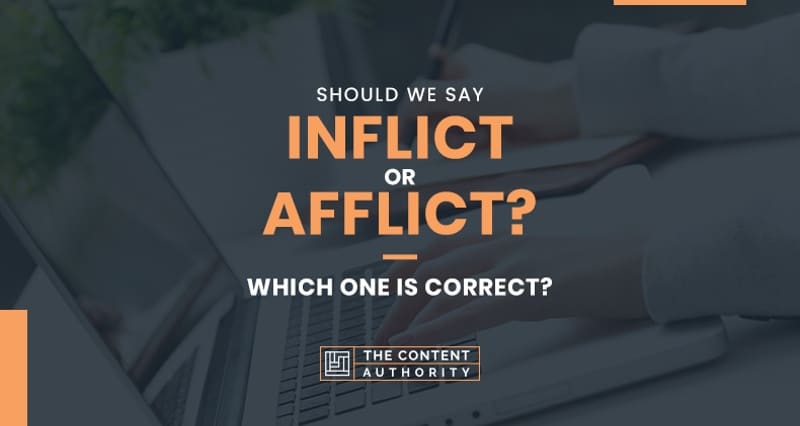There are certain words that are truly a pain to figure out if they are being used correctly or not. The more similar in sound, spelling, and meaning, the more the pain, and this pair in particular, “inflict” and “afflict” are big on this.
The word “inflict” is to be used when someone “forces pain unto another”, like kicking someone on purpose. However, “afflict” which is also related to pain is more about a pain that is caused due to natural causes, not intended but more a consequence of something.
Whether you use “inflict” or “afflict” more often, it is both relevant and necessary to know when and how to use each. Continue reading and you will learn more about the ins and outs of these words and how the “pain” is caused.
“Inflict” vs “Afflict”: How Are These Words Connected?
Just by reading these two, listening to how each is pronounced when we speak it is clear that there is a connection between them. When looking at their spelling it is noticeable too that they have the same ending syllable: -flict. But, the confusion between these two words comes from their shared meaning: pain.
Regardless of the source, the cause, or form of the pain, the words “inflict” and “afflict” can and will be used often to speak of it. The uses of them can be literal, like physical pain, or figurate like an existential dread. They can both be used with objects in a sentence, with collective nouns, and especially with plural forms.
“Inflict” and “afflict” are also verbs, which means that their variations will be similar when using the gerund, infinitive, and participle forms.

“Inflict”-Origin Of The Word And Meaning
The word “inflict” comes from the combination of the Latin particle “in” which means “into” and the Latin word “fligere” which means “to strike”, these two formed “infligere” which meant “to strike against” or “to trouble”. Later in the Mid-16th century, the word became “inflict” with the spelling we use and know. The word “inflict” as we know it today, is also connected to the Latin word “inflictus”, which is the past participle of “infligere” which is the root word.
The meaning of the word “inflict” is “to cause something painful to be suffered by something or someone”, it can also mean “to cause something unpleasant”. However, the first time the word was used in the 1590’s it meant “to lay or impose as something that must be suffered”.
As a verb, the word “inflict” is a transitive verb, which means it can take a direct object, which means that the action the verb describes can be directly done to something or someone. The different forms in which the verb can be used are:
- Infinitive: “to inflict”
- Gerund: “inflicting”
- Past and past participle: “inflicted”
- Third-person: “inflicts”
In addition to being primarily a verb “inflict” also has a noun and adjective forms. As a noun it can be “inflicter” or “inflictor” and as an adjective “inflictive”. It can also be an object when using the variation “infliction”.
Example Sentences With The Word “Inflict”
- I had never met anyone that relished that much in other people’s suffering. She would take every opportunity to inflict pain.
- Natural disasters inflict damage wherever they go. Both people and properties take a big toll every time there is one.
- When laws are broken authorities don’t have a choice but to inflict some form of punishment, otherwise society will fall into unstoppable chaos.
- The thieves were assaulted by the guard dogs on the property. I had never seen dogs inflict such damage on people before.
- No other ruler could inflict as much damage as this one. But people were blind at the time of the election and he rose to power and unleashed hell.
“Afflict”-Origin Of The Word And Meaning
Considering the similarities between “inflict” and “afflict” one would assume that their origins are the same but actually “afflict” comes from the Old French word “aflictere” and also the Latin word “aflictare”. The meaning of these words is “to harass, damage or torment”. These root words are also connected to the frequentative form “affligere” which meant “to dash down or overthrow”.
The first time this word was used was in the late 14th Century, at that time it meant “to cast down” but this meaning is now obsolete. The transferred meaning that we know and use now came from the 1530’s and it was defined as “troubling the body or mind, to harass or distress”.
Currently the word “afflict” means “to cause trouble or pain”, also the trouble or pain caused by a disease or illness, or to “affect adversely”. It can also mean to “cause persistent anguish or suffering”.
The word “afflict”, different to “inflict” is used when pain and suffering have happened to a person, place, or object but not one person, in particular, is the reason behind that pain or suffering. Like when speaking of poverty, hunger, disease, injuries, or self-done, yet unintentional harm like caring for a person and being broken-hearted because that person does not feel the same way.
“Afflict” in the family of words is a verb but it also has a noun and adjective variation. It also has different conjugations from the infinitive root of the word that should be used depending on the context where it is used. Here they are:
- Infinitive: “to afflict”
- Gerund: “afflicting”
- Past and past particle: “afflicted”
- Third-person: “afflicts”
- Noun: “affliction”
- Adjective: “afflictive”

Example Sentences With The Word “Afflict”
- They always said that a dark force would afflict anyone that moved into that property. It has been vacant for years and the house has deteriorated beyond repair.
- Nothing can afflict the soul more than a broken heart. After they broke up life was never the same for either of them.
- The common cold is a disease that afflicts thousands every year and no matter how far medicine has advanced we can’t seem to make it go away.
- Nothing could afflict those people. They had been through so much already they had grown thick skins and faced troubles head-on.
- Natural phenomena like tornados and sandstorm afflict communities all over the world without so much of a warning.
Example Sentences With The Different Variations of “Inflict” And “Afflict”
- Inflicting pain on those she loved was what she knew how to do best. She was one of those people who you love but you were better of without her.
- Princess Diana afflicted millions with her death. She was a remarkable human being, placed in circumstances that she was not prepared to manage from such a young age, so people came to love her.
- They said the way he cared for others was his biggest affliction. I always felt it was more a gift, it takes so much courage to care so deeply for others.
- He was so blinded by his rage that he could not feel how he had been inflicted by his opponent.
- It was never my intention to afflict you, but what is done is done and I can’t take it back.
- Syria has been afflicted with war, famine, and death for so long. At this point, there is not much to be done. Most people have left or died and the few that remain are like ghosts haunting a memory.
- When humans are bitten by a venomous creature, the skin is cut and the body inflicted with poison that can go from paralyzing a person to causing delusion, blood clotting, the inability to breathe, and even death in a matter of seconds.
- The memories from my childhood are like an affliction, things I wish I could forget but as much as I have tried I can’t.
- He was a fan of inflicting suffering. That’s why he enjoyed working as a jailer for those who were sentenced to death row.
- Love is quite the afflictive emotion, as much as it brings you joy it also comes with longing and suffering.

Conclusion
To “inflict” or to “afflict” which one should you use when writing? They are both correct words, they both have a meaning and a context where they should be applied. The important aspect to remember is that since they both mean pain or suffering differentiating if the pain is being caused or it just happens to come with the territory will tell you which one to use.
When you use “inflict” in a sentence it is because the suffering or punishment is being bestowed upon the person or object on purpose, regardless of the reason why. But when you use “afflict” it is suitable for situations in which the adversity and pain could not be avoided and usually have happened due to the situation not because it was intentional.
Now you will know, and the next time you see these words, you will be able to use them and understand what is being said due to their meaning, the context, and by acknowledging the use of each in a given scenario.
Shawn Manaher is the founder and CEO of The Content Authority. He’s one part content manager, one part writing ninja organizer, and two parts leader of top content creators. You don’t even want to know what he calls pancakes.

